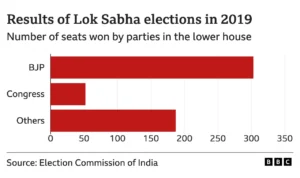India 2024: The Crossroads of Democracy

As the world’s largest democracy gears up for its next pivotal moment, the Indian General Elections of 2024 stand as a defining event not only for the nation itself but also for the global stage. With over a billion people set to cast their votes, the choices made in the coming months will resonate far beyond the borders of the subcontinent, shaping economic policies, geopolitical alliances, and social reforms for years to come.
Backdrop of Indian Democracy
India’s journey as a democratic republic since gaining independence in 1947 has been tumultuous yet triumphant. The country’s electoral process, a celebration of diversity and unity amidst complexity, has consistently drawn attention for its scale and logistical challenges. From the first elections in 1952 to the upcoming 2024 polls, India has witnessed the evolution of political parties, ideologies, and voter expectations.
Key Issues and Challenges
The 2024 elections arrive at a critical juncture, with several pressing issues dominating the national discourse:
1. Economic Revitalization: India, like many nations, faces the aftermath of a global pandemic. The incoming government must navigate economic recovery while ensuring sustainable growth and employment opportunities for a burgeoning young population.
2. Social Cohesion: As a nation of diverse cultures, religions, and languages, India continually grapples with issues of communal harmony and social justice. Ensuring the rights and security of minority communities remains a cornerstone of democratic governance.
3. Environmental Sustainability: Amidst rapid industrialization and urbanization, environmental concerns loom large. From air quality in major cities to the preservation of natural resources, voters expect policies that balance economic development with ecological responsibility.
4. Geopolitical Strategy: India’s position in global geopolitics is increasingly pivotal. Relations with neighboring countries, particularly Pakistan and China, influence not only regional stability but also international trade and security alliances.
The Contenders and Their Platforms

The political landscape in 2024 is vibrant and diverse, reflecting India’s pluralistic society. Key parties and alliances include:
1. Bharatiya Janata Party (BJP): Led by Prime Minister Narendra Modi, the BJP emphasizes economic reforms, national security, and cultural identity. Modi’s leadership style and populist appeal have garnered significant support, particularly among India’s youth and middle-class voters.
2. Indian National Congress (INC): India’s oldest political party, the INC, led by Rahul Gandhi, advocates for social welfare programs, economic equality, and secular governance. The party aims to regain its historical prominence after recent electoral setbacks.
3. Regional Forces: State-level parties such as the Trinamool Congress (TMC) in West Bengal, Aam Aadmi Party (AAP) in Delhi, and Dravida Munnetra Kazhagam (DMK) in Tamil Nadu wield considerable influence, addressing regional issues while impacting national politics through coalition-building.
Role of Technology and Media

The 2024 elections mark a significant shift towards digital campaigning and media influence. Social media platforms amplify political narratives, while data analytics and targeted messaging play crucial roles in shaping voter perceptions. The challenge lies in ensuring transparency and accountability amidst the proliferation of misinformation and fake news.
The Electoral Process
Conducting elections in a nation as vast and diverse as India is a logistical marvel. From voter registration drives to polling station management, the Election Commission of India (ECI) orchestrates a mammoth exercise in democracy, upholding the principles of free and fair elections.
Impact on Global Affairs
Beyond domestic policy implications, the outcome of the 2024 elections will resonate globally. India’s economic trajectory, defense partnerships, and stance on international issues like climate change and trade agreements will influence global agendas and diplomatic alignments.
Conclusion
As India prepares to exercise its democratic right in the 2024 elections, the world watches with anticipation. The choices made by voters will not only determine the nation’s future trajectory but also reaffirm the resilience of democratic values in an increasingly interconnected world. With challenges aplenty and opportunities abound, India stands at the crossroads of history, poised to shape its destiny and contribute to the global discourse on governance, progress, and inclusivity.

In the cacophony of political rhetoric and policy promises, one truth remains steadfast: the power of the ballot to forge a path towards a more prosperous, equitable, and harmonious India.
The Highlight of this election was when the PM Modi says after getting selected by NDA will work towards building a ”VIKSIT BHARAT”
Sources indicate that the meeting focused on discussions regarding the formation of the government by the NDA. It is expected that PM Modi will be sworn in for his third term on June 8.
The Election Commission of India announced the results on Tuesday, revealing that the BJP won 240 seats, while the Congress secured 99 seats. This marks a decrease from the BJP’s previous victories, having won 303 seats in the 2019 general elections and 282 seats in the 2014 general elections.
Indian PM Narendra Modi has won a third consecutive term in a much tighter general election than anticipated.
His Bhartiya Janata Party (BJP) looks set to fall short of a majority and is leading in the 543-seat parliament, below the required 272 seats. However, its coalition partners have gained additional seats.
More than 640 million people voted in a marathon seven-week election, hailed as a “world record” by election authorities. Nearly half of the voters were women.
